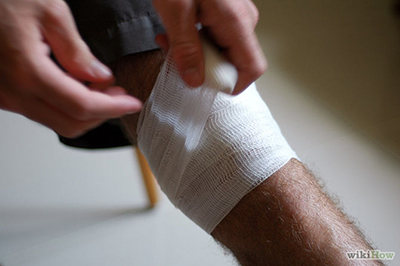
Source: www.wikihow.com
A 17 year old teenager enters the consultation room with a crutch. He smiles. A very familiar expression. “How are you today, Adam?” I asked.
He sits on the chair across me. His mum remained standing. Adam broke a femur bone on his right leg in an accident 3 weeks ago. We had a surgical plating done where the broken femur was corrected and stabilised with a metal implant. Without this surgery, the bones would have healed with a 4cm gap and cause him to limp permanently.
“I’m good, doctor. Alhamdulillah. The wound has healed although I sometimes feel aches on my right leg,” he replied jovially. I inspected it. There is a 15cm long scar which has healed. The stitches have been removed.
“The wound looks good, Adam. It has healed completely,” I smiled. The mum interjected, “I made him stay in confinement doctor. After the surgery, I didn’t allow him to have eggs, chicken, fish and all that. In case the wound turns septic.” I gave an awkward smile.
Our society loves confinements. If you do not adhere to it, your wounds would turn septic or heal at a slower rate, or so they believe. But is this true? Do scientific research prove the effectiveness of confinements?
There are several factors affecting the rate of wound recovery which includes;
- Size of the wound
- Sufficient red blood cells (hemoglobin)
- No bacterial infection
- Balanced nutrition in meals especially protein.
- Patient’s health condition – such as diabetes, liver or kidney problems
Foods such as fish, chicken and eggs are very rich in protein. Confining oneself from eating these foods will expose the patient to the risk of protein deficiency and slow down the rate of wound healing. The belief that foods high in protein would cause irritation and cause pus in wounds are not scientifically proven.
Patients are recommended to consume red meats, beans, and spinach which would help to increase red blood cell production. Red blood cells plays a very important role in wound recovery where it transports nutrition and other cells involved in tissue formation and the immune system.
Optimum blood sugar control in the blood would help quicken the rate of wound healing. Therefore, it is important to limit the intake of sweetened food and drinks. Blood sugar levels in the blood needs to be checked regularly to make sure it is under control.
Patients with liver and kidney problems will usually experience water retention where parts of the leg or hands become swollen due to edema or excessive water content. This causes the wound on the skin to be stretched and affect the healing process. Patients will have to adhere to the doctor’s advise on the maximum water intake each day. Medication may be prescribed to allow excess water to be removed through urination.
Apart from the above mentioned points, the most important confinement is to AVOID SMOKING. Based on research, smoking not only slows down the rate of wound healing but also stunts the process of bone reattachment, lowers the body’s defense system and expose the wound to bacterial infection.
If you would still practice confinement, my advise is to confine from smoking.
This article is written by one of our permanent columnist on the Malaysian Medical Gazette, Dr. Mahyuddin. He is an orthopedic based at a hospital in Pahang. Learn more about him on The Team. This article was translated by Nur Nadhirah from https://www.mmgazette.com/perlukah-berpantang-selepas-pembedahan-dr-ahmad-mahyuddin/
[This article belongs to The Malaysian Medical Gazette. Any republication (online or offline) without written permission from The Malaysian Medical Gazette is prohibited.]
